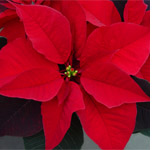Better Safe than Sorry!
 ASPCA HOLIDAY SAFETY ALERT: THE FINAL WORD ON POINSETTIAS: Attention, poinsettia-loving pet owners! You need not fear this festive holiday plant—rumors of its toxic potential are greatly exaggerated, say ASPCA experts.
ASPCA HOLIDAY SAFETY ALERT: THE FINAL WORD ON POINSETTIAS: Attention, poinsettia-loving pet owners! You need not fear this festive holiday plant—rumors of its toxic potential are greatly exaggerated, say ASPCA experts.As our toxicologists at the ASPCA Animal Poison Control Center (APCC) explain, poinsettias were first brought to the United States in the 1820s by J. Robert Poinsett, the U.S. Ambassador to Mexico at the time. The myth of the plant’s toxicity began when the two-year-old child of a U.S. Army officer allegedly died from eating a poinsettia leaf.
Says the APCC’s Dana B. Farbman, CVT, “In reality, ingestions typically produce only mild to moderate gastrointestinal tract irritation in pets, which may include drooling, vomiting and diarrhea.” So while it’s still a good idea to keep this plant out of your pets’ reach to avoid stomach upset, you need not banish it from your homes.
For additional holiday safety tips, please visit ASPCA online.

0 Comments:
Post a Comment
<< Home